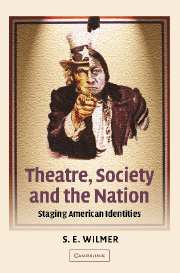Book contents
- Frontmatter
- Contents
- Acknowledgements
- Introduction
- 1 From British colony to independent nation: refashioning identity
- 2 Federalist and Democratic Republican theatre: partisan drama in nationalist trappings
- 3 Independence for whom? American Indians and the Ghost Dance
- 4 The role of workers in the nation: the Paterson Strike Pageant
- 5 Staging social rebellion in the 1960s
- 6 Reconfiguring patriarchy: suffragette and feminist plays
- 7 Imaging and deconstructing the multicultural nation in the 1990s
- Notes
- Select bibliography
- Index
2 - Federalist and Democratic Republican theatre: partisan drama in nationalist trappings
Published online by Cambridge University Press: 22 September 2009
- Frontmatter
- Contents
- Acknowledgements
- Introduction
- 1 From British colony to independent nation: refashioning identity
- 2 Federalist and Democratic Republican theatre: partisan drama in nationalist trappings
- 3 Independence for whom? American Indians and the Ghost Dance
- 4 The role of workers in the nation: the Paterson Strike Pageant
- 5 Staging social rebellion in the 1960s
- 6 Reconfiguring patriarchy: suffragette and feminist plays
- 7 Imaging and deconstructing the multicultural nation in the 1990s
- Notes
- Select bibliography
- Index
Summary
The 1790s were an important decade for clarifying the values of the new nation. Following the establishment of a Federal constitution and the election of George Washington as the first President, political factions in America used the theatre to promote contradictory political agenda. Leading theatre scholars have described many of the plays from this era as nationalistic. However, rather than simply uniting the audience in proclaiming the virtues of their heritage, some of these plays were partisan and divisive. This chapter will look closely at the rhetoric of four of these plays and at their political and social context. By contrasting their rhetoric, it will become clear that each play contributed to a dynamic political discussion about the future of the country and helped to define the values of the nation in a particular manner.
Bunker-Hill
John Burk's Bunker-Hill; or, The Death of General Warren, which was performed in Boston and New York in 1797, ostensibly celebrates American bravery in the American War of Independence. During the course of the play, General Joseph Warren gallantly leaves home to take up arms against the British after the military incidents at Lexington and Concord. A great battle scene ensues, and Warren dies defending Bunker Hill and the American cause. The actors and manager accompanied President John Adams, who attended a performance of the play in New York, out of the theatre afterwards.
- Type
- Chapter
- Information
- Theatre, Society and the NationStaging American Identities, pp. 53 - 79Publisher: Cambridge University PressPrint publication year: 2002



